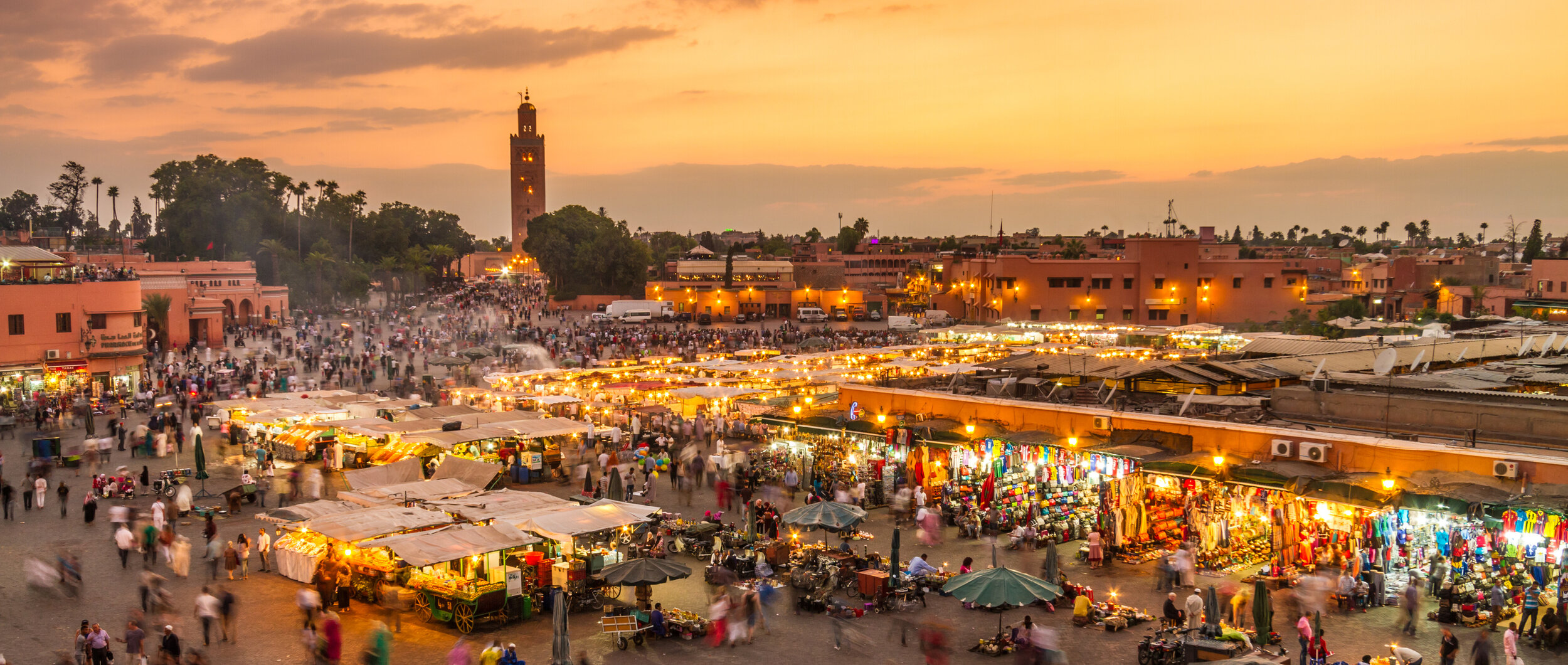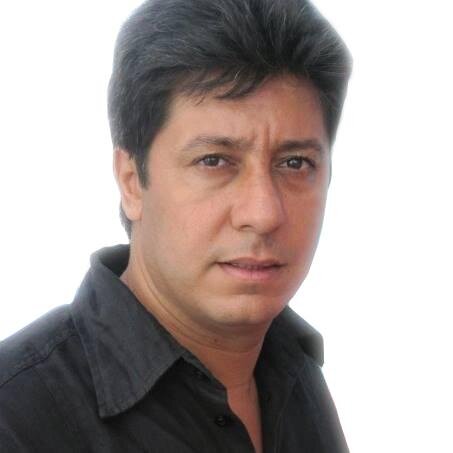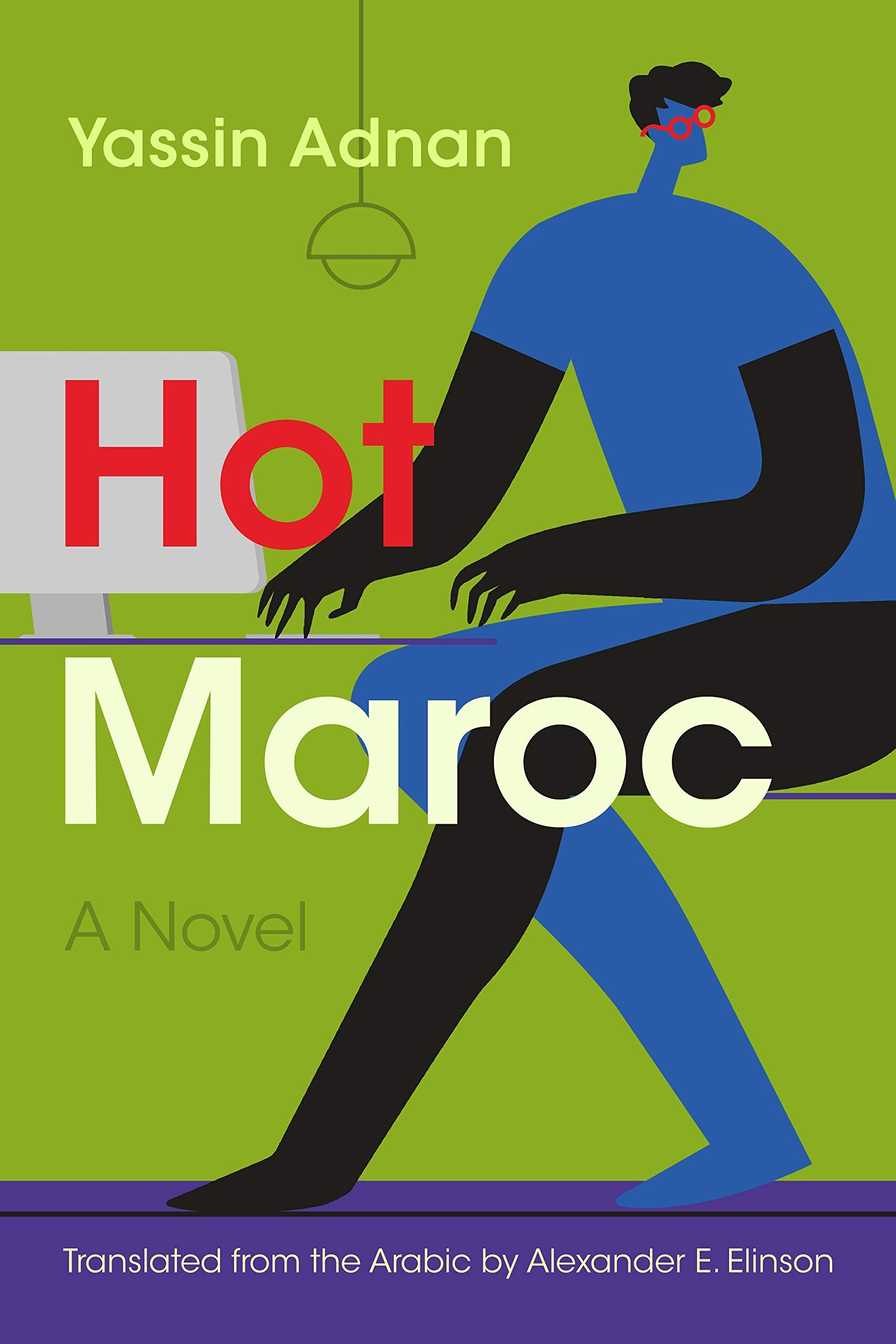
Hot Maroc, a novel by Yassin Adnan
Translated from the Arabic by Alexander E. Elinson
Syracuse University Press (August 2021)
ISBN
El Habib Louai
Hot Maroc is a satirical work of fiction that portrays the flaws of Moroccan society and the political tribulations it traversed in the 1990s and early 2000s, when the internet had just been introduced into the texture of Moroccan life, resulting in a drastic change. It does so through a multiplicity of bestial characters that reveal the concrete possibilities of man in a country ruined by corruption, nepotism, social hypocrisy and greed. One of these characters is a whimsical short, slight man named Rahhal Laâouina, who is the focal point and action carrier of Hot Maroc‘s plot.
Laâouina is a desperately deprived coward who leads a marginal life in the shadow in the bustling city of Marrakesh. Ignored and derided by his classmates and friends due to his deprivation and physical appearance, Laâouina was spurred to bear a grudge against successful people and constantly worries about falling from grace, which subsequently leads to his use of degenerate ways to achieve ignoble ends. Though he thinks of himself as a squirrel, he is easily identified by his “rat-like face and two narrow eyes,” which help him become an expert on animal natures, easily uncovering each person’s corresponding animal through careful scrutiny of their faces, their temperament, the logic of their thinking and their style of argumentation. His insecurities and feebleness make of him a man without principles, ready to relinquish his power and aspirations to others. He contents himself with heroic deeds achieved only in dreams, defamation, contrivance of charges and forgery of pseudonyms on news sites and social media outlets like Facebook.
Laâouina was born into a poor working-class family. Unemployed, his father got by on reciting the Quran in the cemetery while his mother was a housewife who awaited the food basket brought back by the father at the end of the day. Yet, Laaouina was able to rise from the abyss of poverty and deprivation after the family moved from a marginal neighborhood to live with his uncle in the old city, where he worked hard to complete his university studies in the department of Arabic literature, which he joined after his failure with history and geography. At Cadi Ayaad University, he became acquainted with the student movement in its leftist, Islamic, revolutionary, reformist, legitimate and banned forms, before he succumbed and eventually married his colleague Hosnia, who helps him secure work at an internet café in one of the city’s popular neighborhoods.
The internet café, where Laâouina first discovers the Hot Maroc website, becomes the headquarters from which he launches his ravaging war exposing, defaming, fabricating charges and fueling rumors about his friends, colleagues and even public figures. He does so with a great deal of malevolence, exerted on real and imaginary enemies through multiple personas and anonymous profiles that he orchestrates in immoral ways. However, Hot Maroc is not a mere website, it is a forged title which uses the French translation of Morocco or ‘Maghreb’ and the English word ‘hot’ to transmit or rather break the news of a deplorable Morocco dismembered by virtual and real crooks who systematically abuse the media and political outlets to tame the masses and advance their own personal agendas.
Two of these personas are outstandingly predominant with a great following: the religious Abu Qatada and the Son of the People distinguished by his patriotic and populist leanings. One of the first victims of Laâouina’s ruthless cunning and “gastric distress” is Wafiq Daraai, the beloved young poet whose popularity and favorable reception among university students, secured by his handsomeness and excellence in the prose poem, Laâouina extremely abhors. Back at the university, and out of mere spite, he provides false information to one of the students about Daraai’s reports to the security services on everything that is happening within the leftist organizations at the university, forcing the poet to withdraw from the public space. Years later, he would continue his defamation of Daraai by his “fiery comments, sly tricks” on the unmerited awarding of Ibn Wanan Prize to Daraai by the Ministry of Culture. Daraai disappears from the scene by turning off his phone at the last moment and the awards ceremony “caused some mayhem to break out when a group of around twenty attendees took it upon themselves to shout out slogans critical of cultural and political corruption, as well as prose poetry and the wasting of public money.”
As for the second victim, Emad Qatifa, Laâouina makes every effort to lure him into the trap of a fake date with Hiyam, the Facebook personality he created in order to spoil Emad’s matrimonial relationship out of jealousy and hatred for his successes, despite the fact that he did not obtain a baccalaureate degree.
Yet Laâouina, who until then had carefully lived in seclusion and had grown accustomed to the anonymous and multiple identities he impersonates, suddenly finds himself under the spotlight of the police and politics. He discovers that the Intelligence Services Commissioner who interrogated and recruited him was none other than his old comrade Moukhtar, one of the zealous figures of the left-wing grassroots faction of the student movement. Intriguingly, the author invites us into the student movement’s atmosphere through a meticulous and hilarious portrayal of the features of that historical phase, when the conflict frequently flared up between the student factions and the slogans were boisterously shouted while the authorities watched cautiously before intervening. Commissioner Ayad simplifies things for Laâouina when he clearly declares, “Today we just need to change our style. We’ll move from the amateur realm to the professional. Do you understand, Rahhal? You’ll remain as you are. But the maneuvers will become tighter.”
He became a “racing rabbit. One of the racing rabbits that run in every direction to keep the Chameleon out in front.” Consequently, Laâouina finds himself losing control over all his virtual identities when he is forced to work for the King’s closest friend’s electoral campaign, against the Islamic party, and to collaborate as an electronic agent of the secret intelligence services. The author describes the absurdity of this electoral campaign in a satirical manner via incidents relating to what came to be known as the Snail Affair before he concludes that, “people didn’t have the energy anymore for […] abstract [ideological] debates, especially for party principles and political plans. People wanted carnivalesque elections, complete with show and spectacle; song and dance; feasts and banquets; small, palpable gains they would win during the campaign. In the end, all candidates are the same. All of them will disappear to work for their own interests and become important people in the capital.”
Through individual lives, Adnan dissects the reality of journalism in Morocco, its shortcomings and the subordination of some of its professionals to agendas imposed by the secret intelligence of the State as in the cases of Naim Marzouk, opinion columnist for Al-Mustaqbal newspaper, and Anouar Mimi, editor-in-chief of the Hot Maroc news site. These quasi-journalists are mere pawns employed to execute the instructions and agendas dictated by intelligence officials without any concern for professional ethics and conscience. The principal role of such fake journalists is to interfere with public opinion, distract the masses and divert their attention from the real issues and concerns of their society. The media in this sense becomes a toy in the hands of the few crooks whose main goal is to monitor news about stars, artists, politicians, scandals, and literary rivalries over awards and invitations. Additionally, Adnan exposes the linguistic flaws and errors in the discourse of empty-headed journalists whose only goal is to secure more followers who would support brainless candidates and politicians fighting over seats in the parliament.
Adnan’s implicit message here emphasizes the fact that the transition from King Hassan II to Mohamed VI’s era did not lead to substantial change despite the soft manipulation of freedom of expression, pluralism and multiple political parties, some of which are oblivious of its ideologies and only exploit religion to lure more voters.
The novel attempts to address the issue of immigration by focusing on the conditions of the sub-Saharan immigrants in Morocco and their Moroccan counterparts. While the sub-Saharan minor characters Amelia, Flora and Yakabo turn to prostitution as a simple and convenient path to make money, the Moroccan young man Qamar Eddine is ready to give up everything and even convert to Christianity in order to cross to the European Eldorado. Sex is also seen in a new light as a commodity that could be bought and sold virtually on the internet; Fadoua and Samira, for instance, frequent the cybercafe to lavishly provide sexual services to all kinds of clients over the web for a fee.
Stylistically, the original version of the novel makes use of both the classical standard Arabic and the spoken colloquial daily Arabic, Darija, especially in dialogues to render them more authentic and real. It blends imaginary events with fragments from the author’s autobiography in a relatively linear story that seeks to disrupt the reader’s horizon of expectation through alternative flashbacks, memories and dreams as in the beginning of the novel. The events are related from the point of view of bitter and sarcastic third-person omniscient narrator who does not participate in the story.
Elinson’s translation is meticulous as it also takes these stylistic elements into consideration including the humor and linguistic registers (political, religious, poetic and journalistic) distinctive of certain characters coming from a particular social class. Elinson elaborates more in details on the challenges involved in the process of translating Hot Maroc:
“In this translation, I have done my best to reflect the linguistic multiplicity that exists in Morocco today. As Adnan moves deftly between varieties of spoken and written Arabic, the reader is able to sense, to hear, the voices as we move through slums, university classrooms, upscale and working-class neighborhoods, political rallies, and all sorts of online worlds.
Hot Maroc is a praiseworthy sarcastic comedy that exposes the historical, political and urban animalities of contemporary Moroccan society through the eyes of a psychologically damaged protagonist who suffered decades of abuse.

As it happens, my first encounter with Yassin Adnan happened inadvertently during a conference organized by the Southern Writers’ Society on May 27, 2011 at Ibn Zohr University in Agadir, Morocco. I had neither any previous knowledge of Adnan nor had I read any of his works though I had frequently heard of his poetry amongst poetry aficionados. On that day, I went to the university to meet my ex-professor of Arabic culture and literature, with whom I had a memorable time debating Modernist American poetry from Pound to the Beats when I was a trainee teacher at Marrakesh’s Regional Pedagogical Center. Oddly enough, my ex-professor of Arabic literature and culture presupposed that I knew Yassin Adnan and contented himself with a mere short introduction without any elaborate details on his literary interests or literary aspirations. Adnan extended a cold hand which I equally shook with a great deal of frigidity. He seemed to be gazing at something out there and looked at me haughtily.
A couple of years later, we met again at the Prose Poem Festival in Marrakesh in 2018, only this time to be greeted warmly perhaps because I bravely stood my ground as a participating poet, translator and band leader surrounded by a bunch of established poets from different foreign countries. In subsequent years, I came to know Adnan both as a poet with two collections (I Could Barely See and The Passerby’s Notebook) and as a familiar polemicist best known to be an anchor on the television show “Masharif.” During one of our nocturnal debates, a colleague with radical political and historical leanings announced that Adnan’s novel Hot Maroc, published by Dar Al Ain in 2016, was longlisted for the International Prize for Arabic Fiction for 2017. I was taken aback by the news and out of mere curiosity I picked the novel up and read it in three days during a mid-term school holiday. I was flabbergasted and immensely amused as it turned out that the novel vividly captured the gist of contemporary Moroccan society with all its contradictions and paradoxes.
In a similar way to the uneasy and tumultuous metamorphosis witnessed by Moroccans in the course of the years chronicled in Hot Maroc, the novel itself came as a result of work in progress that Adnan initiated during a three-week literary residency on the Côte d’Azur in 2011, and continued penning during his holiday journeys to America and Brussels. There in Provence the book was preliminarily conceived of as a short story idea before it mutated into a wonderfully full-fledged novel that engulfed the author in its interwoven and labyrinthine narrative.
Ironically, Adnan affirms that none of the chapters constituting the closely-knit symphonic texture of the novel was penned in Marrakesh, the city where the incidents portrayed take place. It is as if a certain kind of self-seclusion and self-distancing were needed to come in terms with the depressing malaise, moroseness and indignance that the author experienced at the time. In his own words, Adnan confesses, “I was then hurt by some electronic bandits who besmeared Facebook and peoples’ reputations. I wondered to myself who were those anonymous individuals with pseudonyms, who poison the electronic atmosphere on Facebook and various interactive internet platforms? And why were they eager to trivialize people’s dreams and shoot every moving thing? This phenomenon has spread widely around Morocco and this is the reason why I decided to work on it.”
Yassin Adnan’s attempt at exposing the repercussions of the political confusion and social upheaval in contemporary Morocco through striking metaphors of utterly preposterous bestial characters secured him a place in the cultural scene amongst some of Morocco’s best-selling fiction writers. Yet, the distinctive virtue of being a best-selling author is subject to circumspection, especially when it is reinforced by an armada of media commentators. Adnan’s Hot Maroc is a fine work of fiction that deserves attention, but one should not overvalue it as Fouad Laroui did when he wrote, “It ranks among the three best Moroccan novels written in any language.” Such a hastily-made encomium causes one to wonder about the merits of the too often disregarded and underestimated literary works by Mohammed Khair-Eddine, Mohamed Choukri, Mohamed Zafzaf and Rachid El Hamri, whose Le Silence Éclatant des Rêves and Le Néant Blue constitute some of the best works of fiction about the homeland, cultural belonging, ambivalent identities and immigration.
Adnan’s work continues to attract large numbers of young readers from different walks of life largely because it deals with a deplorable reality that most Moroccans presumably perceive but yet lack the mechanisms and ardor to change.




